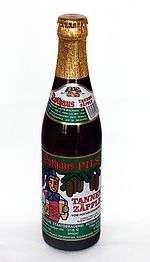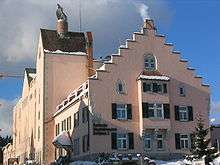Rothaus
 | |||||||||||||||||
| Type | State-owned corporation | ||||||||||||||||
|---|---|---|---|---|---|---|---|---|---|---|---|---|---|---|---|---|---|
| Location | Grafenhausen, Baden-Württemberg, Germany | ||||||||||||||||
| Coordinates | 47°47′47″N 8°14′44″E / 47.79639°N 8.24556°ECoordinates: 47°47′47″N 8°14′44″E / 47.79639°N 8.24556°E | ||||||||||||||||
| Opened | 1791 | ||||||||||||||||
| Key people | Thomas Schäuble | ||||||||||||||||
| Annual production volume | 838,000 hectolitres (714,000 US bbl) in 2011 | ||||||||||||||||
| Revenue | €89.2 million (2008)[1] | ||||||||||||||||
| Owner(s) | state of Baden-Württemberg | ||||||||||||||||
| Employees | 230 | ||||||||||||||||
| Website |
rothaus | ||||||||||||||||
| Active beers | |||||||||||||||||
| |||||||||||||||||
The Badische Staatsbrauerei Rothaus (Rothaus, State Brewery of Baden) is a brewery located 1,000 metres (3,300 ft) above sea level in Rothaus, located at the north edge of the village of Grafenhausen in the southern Black Forest. It is one of Germany's most successful and profitable regional breweries, and in the past decade has become well known outside Baden as well. The brewery remains 100% owned by the state of Baden-Württemberg.
Products


The most successful product, a Pilsner-style beer, "Rothaus Tannenzäpfle" or simply "Zäpfle", comes filled in 33 cl (12 imp fl oz; 11 US fl oz) bottles and is available in stores in Baden-Württemberg, well known as a "cult beer" throughout Germany in supermarkets and kiosks, as well as in various nightlife establishments. Tannenzäpfle literally means "little fir cone" and is a reference to the shape of the bottle. Despite Rothaus refraining from any intensive advertising campaigns, the demand for the once-local beer is spreading further throughout Germany.
The labels of the bottles are printed with a likeness of "Birgit Kraft," a blonde girl in traditional dress for the region, bearing two glasses of beer. Birgit's name is something of a pun; in the local dialect of Alemannic German, "Bier git Kraft", ("Bier gibt Kraft") means "beer gives strength".[2] The specific variety of fir cones named as Tannenzäpfle grow upwards from the branches instead of hanging from them in spite of their depiction on the bottle; this is commonly explained as a reference to the position of the bottle while it is being consumed.
The Hefeweizen version of this beer is available on draught in All Bar One bars in the UK
History

The brewery was founded in 1791 by the Abbot of St. Blasien Martin Gerbert as a measure to encourage economic growth in the Black Forest. Through secularization, the cloister eventually changed ownership in 1806 to the Grand Duchy of Baden. The name "Rothaus, State Brewery of Baden" has been in use since the abolition of the monarchy in 1918, and its name still remains to this day although the brewery is now in the full ownership of the Bundesland Baden-Württemberg.
In 2006, the brand "Tannenzäpfle" celebrated its 50th year of existence with a fiftieth anniversary edition of the original 1956 label design.
Economic significance

The brewery experienced a doubling of its output in the 1990s under the direction of the new chairman of the board, Norbert Nothelfer, who had previously been employed in a position comparable to governor of a sub-division of a state. This, while noteworthy in itself, is more remarkable in light of the shrinking beer consumption by Germans. The capacity was increased to one million hectoliters of beer. In the business year 2008, the brewery put out 941,000 hectolitres (802,000 US bbl) of beer, grossing roughly €89.2 million.[3] 2011 the output was 838,000 hectolitres (714,000 US bbl).[4]
The company is an important employer in the otherwise economically weak area of the south-central Black Forest. In 2008, the brewery employed 230 people and paid €17 million as dividends to its owner, the state of Baden-Württemberg. It also paid €16.7 million in tax.[5]
References
- ↑ http://www.badische-zeitung.de/nachrichten/wirtschaft/rekordjahr-fuer-rothaus-brauerei--14970399.html
- ↑ http://rothaus.de/html/05birgit/05_brigit_main_inhalt.htm Rothaus.de on Birgit Kraft (German)
- ↑ http://www.badische-zeitung.de/nachrichten/wirtschaft/rekordjahr-fuer-rothaus-brauerei--14970399.html
- ↑ http://www.business-on.de/suedbaden/rothaus-brauerei-hektoliter-bierausstoss-bierumsatz-rueckgang-_id16407.html
- ↑ http://www.badische-zeitung.de/nachrichten/wirtschaft/rekordjahr-fuer-rothaus-brauerei--14970399.html
| Wikimedia Commons has media related to Badische Staatsbrauerei Rothaus. |
External links
- (German)(English) http://www.rothaus.de/
- (German) http://www.zum.de/Faecher/G/BW/Landeskunde/rhein/wirtschaft/brau/rothaus/index.htm
- (German) Man trinkt wieder Heimat, an article on the growing success of Rothaus.
- (English) Growing Taste for Black Forest Beer: The Reluctant Cult Brand , an article about Rothaus from Spiegel International.
- (English) Word of Mouth Fills German Brewer’s Steins , an article about Rothaus from The New York Times.